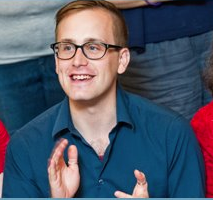“‘Absurdity of absurdities,’ said Kohelet, ‘Absurdity of absurdities. It’s all absurd’”1 (Koh. 1:2). These are the first words that we hear from Kohelet, the son of King David whose philosophical musings we read during Sukkot. Kohelet is arguably the most cynical book in Tanakh. There is not much hope, there is not much joy, there are no other people that Kohelet interacts with–Kohelet doesn’t even speak with God. As a result, we get to know Kohelet much better than we do anyone else in Tanakh. We get a sense of his psychology, of what makes him tick, and how much of a downer he can be. You might see this as an unusual choice for the book to be read during z’man simchateinu/the time of our joy, but Kohelet offers us some helpful wisdom during this time.
This past summer, I met my Kohelet. Somewhere inside me, he was speaking the words, “Absurdity of absurdities. It’s all absurd.” I saw the news about Israel & Palestine. About Ferguson. About Ukraine. About Ebola. About the Malaysian airplane. Syria. I saw how my friends, family, extended communities, and elected officials were (not) talking about these events on Facebook, in real life, in the media. I felt my own throat grow tight with anger, fear, and sadness. “Absurdity of absurdities! It’s all absurd!” Kohelet’s words grew to a shout within me.
As someone who thinks of myself as a community organizer and a person of faith, I have long held the belief that, with the help of God, we have the ability to push through the terrible muck of the world and identify ways to drain it. It doesn’t always work, but there are always things to try.
This summer, Kohelet’s voice came in so loudly, I lost hold of that faith. Everything seemed absurd. There was nothing I could do. There was no one I could talk to, not even God. Prayer seemed pointless. Activism seemed pointless. Dialogue seemed pointless. The world was a mess. It was all terribly, horribly absurd. I had become Kohelet.
I felt Kohelet’s thoughts, “That which is crooked cannot be made straight” (1:15). I looked around and I saw Kohelet’s words, “Wisdom is better than strength, but the wisdom of the poor is despised and their words are not heard” (8:16). My inner Kohelet grew and grew until I could hear no other parts of myself. This ancient Judean was occupying my entire mind. I was stuck and unable to act in any meaningful way.
Now we have made it through the near death experience of Yom Kippur and arrived at the time of our joy. With some of the active violence of the summer having quieted, it would be easy to believe that we have achieved some semblance of peace, but we are still far from justice. Kohelet, in z’man simchateinu, reminds us not to be overly zealous in our joy. He reminds us of the absurdity of the pain and suffering in the world.
Like the stake that begins the construction of the Sukkah after Yom Kippur, Sukkot is a time of grounding. Yes, it is a time of joy, but it is not pure, unadulterated joy. It is a joy tempered by the suffering of the world. During Sukkot, we invite Kohelet in, like any part of ourselves, carefully and intentionally. We thank him for the wisdom he shares with us and we do not let him take over.
This summer, my Kohelet arrived at the wrong season, but I do believe that my Kohelet, all of our Kohelets, play an important role in our spiritual and political lives. As Kohelet himself says, “To everything there is a season, and a time for every purpose under the heavens” (3:1). This includes Kohelet himself. Even Kohelet has an appropriate time and purpose, and that time is now and that purpose is essential.
1While some translations read this as “Vanity of vanities,” biblical scholar Michael V. Fox makes a compelling argument in A Time to Tear Down and a Time to Build Up: A Rereading of Ecclesiastes, to read it as “absurdity of absurdities.”
Alex Weissman is in his fourth year of studies at the Reconstructionist Rabbinical College and is an alumnus of T’ruah’s Rabbinical and Cantorial Student Summer Fellowship in Human Rights. He has been a community organizer with JFREJ, CBST, and POWER and is particularly interested in providing spiritual support for social movements and organizers.

